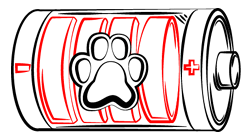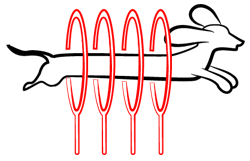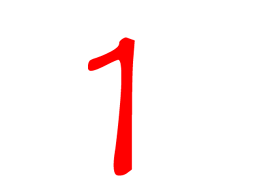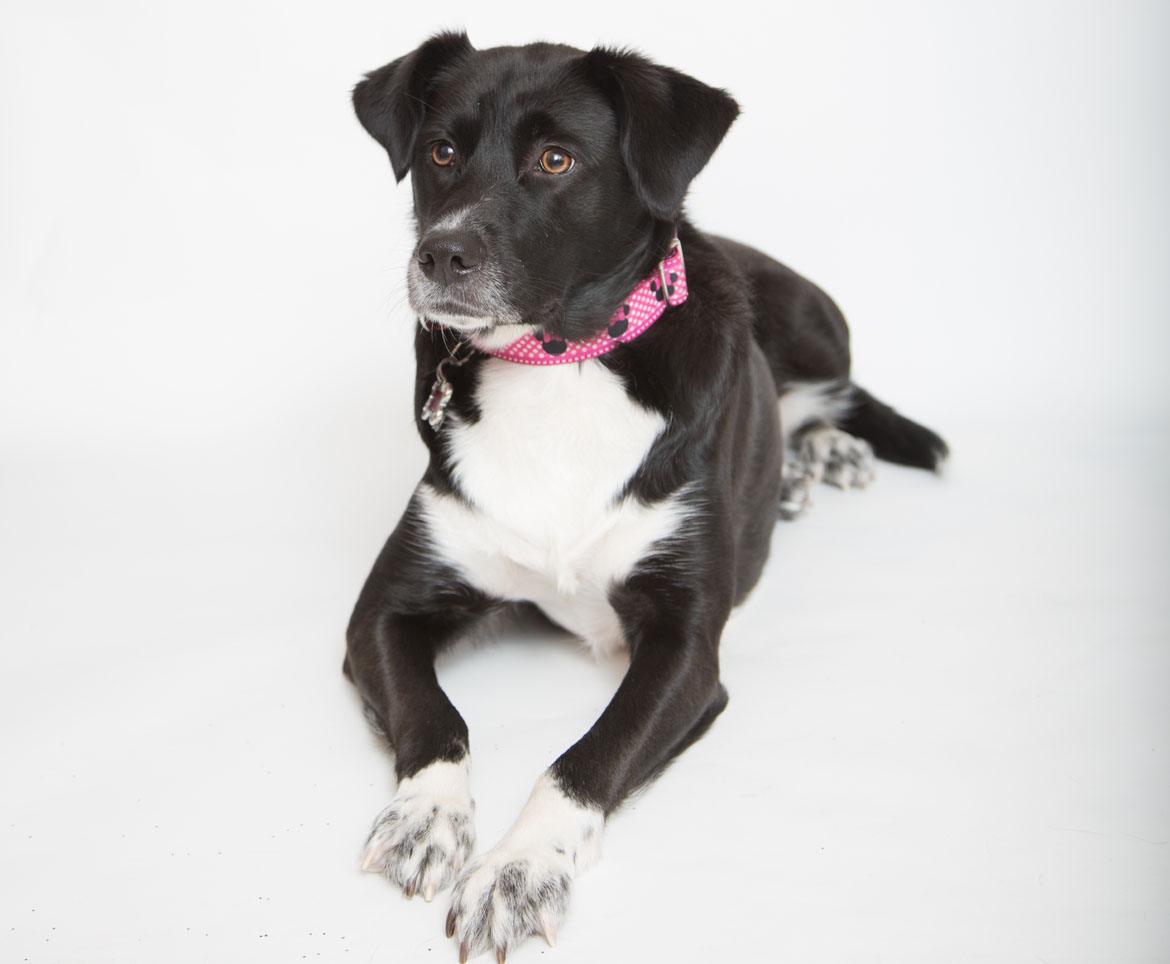
Paws ‘N’ Pups Quickview
Size
| Energy Level
| Trainability
| Paws ‘N’ Pups Rank
|
Characteristics
| Physical Characteristics: Height: Up to 25” Weight: 40-60 lbs. Energy Level: High | Colors: The Labrador Husky is found in the following colors:
|
Health & Longevity
Average Life Span: 10-15 years
The Labrador Husky, also known as the Husky Lab, is a hybrid breed of the Labrador Retriever and Siberian Husky. This breed does not have many major health concerns, but there are a couple that you should be aware of. It is important that you work with a reputable breeder to ensure that your puppy is free from these diseases.
Some of the conditions that you need to pay attention to include epilepsy, eye problems, heart problems, OCD, bloat, cold tail, joint dysplasia, and ear infections.
Epilepsy is also known as seizures and they can range in severity. Some seizures are mild while others are quite violent and include foaming at the mouth and convulsions. If your pet suffers from epilepsy, you should work closely with your vet to learn how to properly care for your pup during an active seizure.
Eye problems may occur in your Husky Lab and it is important that you pay attention to the health of your pup’s eyes. The types of eye conditions that your puppy may face include eye infections, atrophy, blindness, cataracts, and similar.
In addition to eye problems, your Husky Lab may suffer from heart problems. These problems can rise at any point in their life and may show up as heart disease, a heart murmur, or any other type of disease. If you think that your Husky Lab has a heart condition, it is important to speak with your vet to monitor the condition itself. Many conditions can be managed with medication.
OCD is a condition that may arise in your Husky Lab and often occurs in the shoulder, but may also show up in the knee or elbow. This condition causes lameness and weakness in your pup’s limbs.
If your pup swallows too much air, it becomes trapped in their belly which causes it to expand and place too much pressure on the organs. This condition is called bloat and is can be fatal if not caught in time.
Common in Labrador Retrievers, cold tail is a disorder that affects the functionality of your dog’s tail. This condition is often referred to as broken tail, broken wag, or dead tail. You will know if your pup has this condition because your puppy will experience pain by the base of the tail and the tail is often limp or flaccid.
Your Husky Lab may have joint dysplasia which is a painful condition for your dog. This condition occurs when the hip joint is deformed or does not fit correctly in the hip socket.
Lastly, your Husky Lab may experience recurrent ear infections. This is a common problem and will require your attention to keep them from happening. Ear infections are treated with medication, but with preventative care and cleaning of your pup’s ears, you can keep ear infections away.
The Husky Lab’s life expectancy is 10 to 15 years.
Temperament & Train-ability
The Husky Lab is likely to inherit all of the wonderful qualities from its parents and you will find that your Husky Lab is intelligent, playful, loving, and happy. This breed likes to have your attention and will fight for it when he or she can.
You will also find that this breed is playful and enjoys a good game of ball or a run out in the yard. You should provide your Husky Lab with a lot of mental and physical stimulation as well as a walk or two during the day.
Your Husky Lab is going to be loyal to you and your family. Since this breed thrives on your attention, he or she should not be left alone for a long period of time as separation anxiety will present itself.
You want to make sure that you socialize your pup early on as not doing so will result in you having a shy Husky Lab on your hand. When socialized early on, your Husky Lab will be wonderful with children and also with other pets.
The Husky Lab is an intelligent and smart breed, which allows for training to be easy. You will find that your dog wants to please you and will work hard to make you happy when it comes to the commands you give.
You need to know that your Husky Lab is not going to respond to harsh methods of training and you should be gentle, yet firm and consistent in the commands you give.
Grooming
Your Husky Lab has moderate grooming needs and will need to be brushed on a daily basis to prevent shedding. You will notice that your pup sheds quite a bit and it may increase as the warmer weather sets in.
You do not need to bathe your pup unless he or she really dirty. In fact, if you notice a dirty spot on his or her coat, a quick wipe down with a wet cloth will do the trick.
You should clean your pup’s ears once per week with a cleansing solution and a cotton ball. Also, you should trim your pup’s nails to prevent them from growing too long. When your Husky Lab’s nails grow too long, you will find that it hurts him or her to walk.
Diet
You can expect your Husky Lab to consume 2 1/2 to 3 cups of food per day. You want to make sure that you purchase a food that is high in protein and contains a lot of nutrients. If your pup does not receive the nutrients he or she needs, you will have an obese or malnourished puppy.
The best food to choose will include whole grains, meats, and vegetables. If you are unsure of what to choose, simply ask your veterinarian for his or her recommendations.
Looking for a Labrador Husky?
 Find A Labrador Husky Breeder |  Labrador Husky Puppies For Sale |  Adopt A Labrador Husky |
Cost
A Husky Lab puppy will cost you between $300 and $750. You may be able to find one of these pups in the local shelter or in a rescue and you can expect to pay an adoption fee of $150 to $300.
Paws ‘N’ Pups Ranking
Paws ‘N’ Pups ranks every breed out of 4 with 1 being easiest to integrate into your life and 4 being the toughest – The lower the ranking the better.
Ranking takes into account a few basic factors including cost, skill level needed, high vs low maintenance and how critical regular training is to success. The Husky Lab is a great dog to call your own and he or she will get along well with everyone in your home. It is important that you brush your puppy daily to prevent shedding. This breed ranks a 1.
Breeds Similar To Labrador Husky
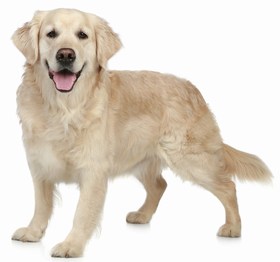 Labrador Retriever | 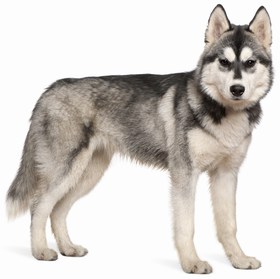 Siberian Husky | 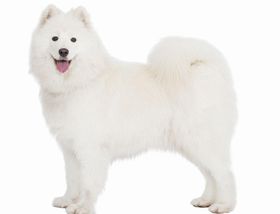 Samoyed | 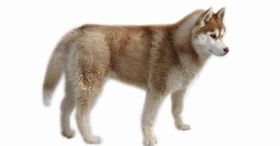 Alusky |


